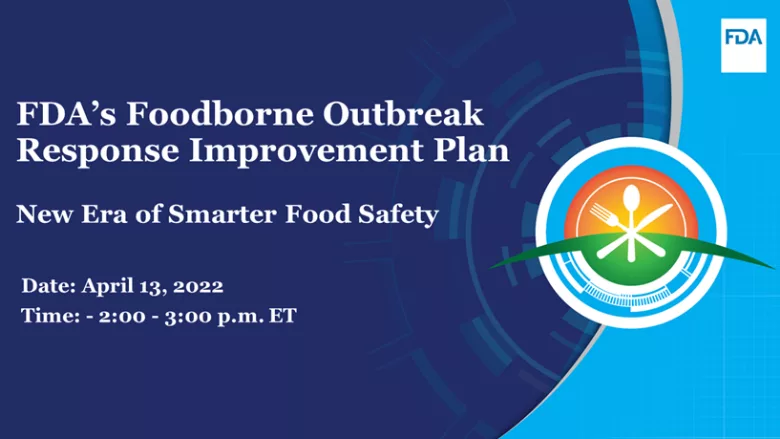FDA Gives Webinar on Foodborne Outbreak Response Improvement Plan

Credit: U.S. Food and Drug Administration (FDA)
On April 13, the U.S. Food and Drug Administration (FDA) conducted a webinar on its Foodborne Outbreak Response Improvement Plan, part of the New Era of Smarter Food Safety. The webinar featured agency representatives and academics who discussed the scientific information behind the Improvement Plan and the plan’s four core priorities. The webinar ended with the panelists answering questions from the public.
Frank Yiannas, FDA Deputy Commissioner of Food Policy and Response, opened the webinar by stressing two main themes that were present throughout the event. The first was the importance of using modern-day tools to meet modern-day needs. FDA is carefully considering how it can best utilize technological tools to improve its foodborne illness outbreak response. The second theme Yiannas raised was that of collaboration. Communication and data-sharing between local, state, and federal agencies, as well as the private sector, is crucial to a timely and effective outbreak response.
Scientific Context
Craig Hedberg, Professor at the University of Minnesota’s School of Public Health and author of “An Independent Review of FDA’s Foodborne Outbreak Response Processes,” spoke on the webinar to discuss his study, which informed FDA’s development of its Improvement Plan. The study assessed FDA’s capacity to respond to multistate outbreaks associated with commercially distributed food, particularly produce. Hedberg’s significant findings included:
- FDA has increased its outbreak response capacity, thanks in part to whole genome sequencing (WGS), which has led to an increased need for rapid traceback in the early stages of investigations
- The traceback process has inherent delays at each step, and could be improved with better use of electronic records, contextualization of environmental assessments with similar outbreaks to find common factors, and earlier and more open communication between parties.
Hedberg went on to suggest ways that state partners can work with FDA. Regarding traceback, Hedberg advised partners to conduct routine interviews and detailed exposure assessments to collect crucial, initial information for source tracing. To identify suspected food items faster, Hedberg proposed looking for sub-clusters of cases around food establishments or retail food stores. Additionally, Hedberg stressed the value of integrating solid epidemiological investigations with environmental assessments. Finally, Hedberg urged states to join with FDA and the U.S. Centers for Disease Control (CDC) in disseminating the important results of outbreak investigations to their constituents.
Priority One: Technology-Enabled Product Traceback
Kari Irvin, Deputy Director of the Office of Coordinated Outbreak Response and Evaluation in the Center for Food Safety and Applied Nutrition, discussed the first core priority of the Improvement Plan. The priority, technology-enabled product traceback, is concerned with reducing the time needed to identify contaminated product by using technological tools. Utilizing technology can improve agency ability to collect quality initial information from case patients in higher quantities, facilitate and expedite how data is received, and conduct accelerated tracebacks using advanced analytics. Irvin also discussed the pertinence of informing relevant partners of new ways of doing tracebacks with current technologies, harmonizing traceability work across FDA, and helping stakeholders use new traceback processes.
Priority Two: Root Cause Investigations (RCIs)
Priority two was presented by Scott MacIntire, Program Director at the Office of Human and Animal Food Operations—West. This priority concerns the gathering and sharing critical investigational findings to more quickly and fully prevent future outbreaks. MacIntire discussed adapting and strengthening RCI protocols and procedures; standardizing the criteria and format for producing RCI reports, including FDA’s intent to publish a model once standardization is achieved; determining the fastest and most transparent process for disseminating public health information garnered from RCIs; and enhancing staff, training, and resources to manage anticipated increases in RCI analyses.
Looking for quick answers on food safety topics?
Try Ask FSM, our new smart AI search tool.
Ask FSM →
Priority Three: Analysis and Dissemination of Outbreak Data
Stic Harris, Director of FDA’s Coordinated Response and Evaluation Network, spoke about the third priority—analysis and dissemination of outbreak data. This priority is concerned with more quickly identifying outbreak sources and providing earlier, more open communication with government partners, industry, and the public. The target goals of this priority are:
- To more fully analyze past outbreaks to understand current outbreaks by identifying trends with data over time
- Facilitating greater sharing of data between FDA, CDC, and state partners, including data on outbreaks and prevention methods
- Increasing the transparency of outbreak investigations with resources such as FDA’s publicly-available CORE Outbreak Investigation Table
- Enhancing efforts to work with CDC and the U.S. Department of Agriculture’s Food Safety and Inspection Service (USDA FSIS) to identify reoccurring/emergent/persistent pathogen strains using WGS.
Priority Four: FDA Operational Improvements
David Goldman, Chief Medical Officer at the Office of Food Policy and Response, relayed priority four—FDA Operational Improvements. Goldman iterated FDA’s intent to collect operational and public health metrics, streamline operations by removing steps or doing things in parallel rather than in sequence, and improve performance by increasing the implementation of early tracebacks.
Questions
The panelists took time at the end of the webinar to answer public questions. These questions covered a range of topics, such as:
- How FDA will protect industry secrets while increasing transparency with the public
- FDA’s actions regarding pet food outbreak investigations
- FDA’s ability to provide actionable guidance to industry
- The availability of foodborne illness response training
- FDA plans for rapid response teams
- FDA and CDC protocols for testing and analysis at relevant farms
- Limitations on the timeliness of identifying the source of an outbreak
- Ways the public and private sectors can collaborate.









